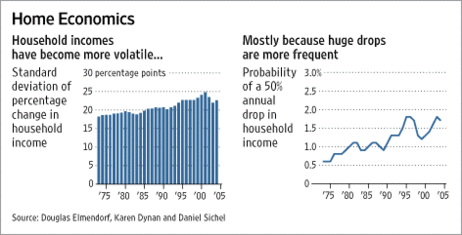 Source of graphs: online version of the WSJ article cited below.
Source of graphs: online version of the WSJ article cited below.
WASHINGTON — Weighing in on an intensifying debate on income insecurity, three economists — including two from the Federal Reserve — have found that American families today are more likely to experience big drops in their income than three decades ago.
Their analysis, however, finds far less volatility in family income than some recent studies.
The authors of the new study, Douglas Elmendorf of the Brookings Institution and senior Fed economists Karen Dynan and Daniel Sichel, caution against interpreting their findings as evidence that families face more risk of hardship than before. They note that financial innovation has given Americans more ways to maintain their spending when their incomes fall. (Read the full study.)
The study found that the volatility of household income rose 23% between the early 1970s and early 2000s. While small changes in family income are no more frequent, large changes in income — more than 50% — are.
The probability that a family will experience a decline in annual income of 50% or more, compared with their average income in the previous three years, rose to 1.8% in 1995 from 0.6% in 1973. After 1995, the probability dipped, and has risen back to 1.7%.
"The increase in volatility we document is not trivial," Mr. Elmendorf said in an interview. "Our work is quite consistent with being concerned about the level and increase in volatility of household income."
That said, "I don’t think our results support the view that the world is dramatically more adverse for households," he added.
. . .
Yet research into the assumption that income volatility has increased has reached differing conclusions. Yale University political scientist and author Jacob Hacker, in a 2006 book titled "The Great Risk Shift," documents a fivefold increase in household-income volatility between the early 1970s and early 1990s. Mr. Hacker, who described himself as "thunderstruck" by the result, has written widely and testified to Congress on the subject. He couldn’t be reached for comment.
By contrast, the Congressional Budget Office, using a different set of data, found that earnings volatility for individuals — as opposed to households — has changed little since the early 1980s.
But the authors argue that bigger swings in income need not force households to slash their spending. They cite preliminary findings from other research they have conducted that show financial innovation, such as easier borrowing against the value of a home, has helped to insulate family spending patterns from fluctuations in income.
For the full story, see:
(Note: ellipsis added.)

